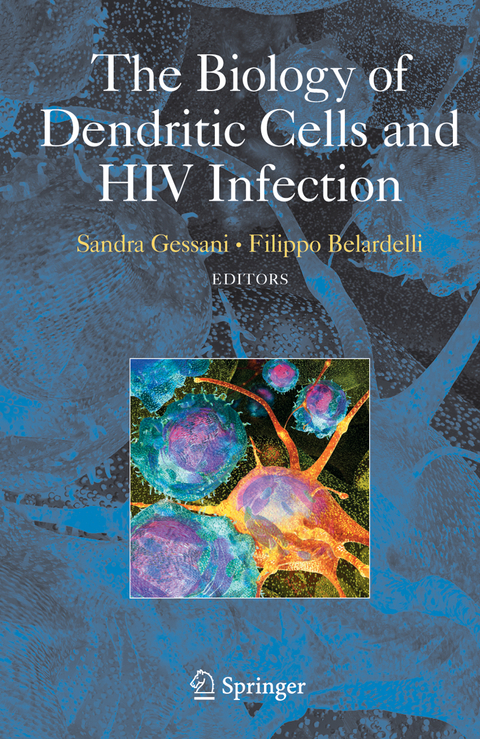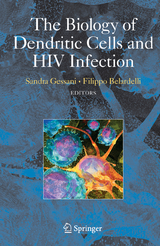The Biology of Dendritic Cells and HIV Infection
Springer-Verlag New York Inc.
978-0-387-33784-5 (ISBN)
Dendritic cells play the most vital part in inducing anti-viral immune responses in HIV and AIDS among many other viruses. Research on dendritic cells (DCs) is emerging as a fundamental aspect for the comprehension of the mechanisms underlying the pathogenesis of viral diseases as well as for the progress on the development of prophylactic and therapeutic vaccines.
This volume focuses on the role of DCs in the pathogenesis and immunity of HIV-1 infection. It has recently been clarified that DCs are important targets and reservoirs of HIV and may play an important role in virus spreading to T cells. Interestingly, HIV can exploit many of the cellular processes responsible for the generation and regulation of the adaptive immune responses to gain access to its main target cells, i.e. the CD4+ T lymphocytes. Thus, the central role of DCs in stimulating T cell activation not only provides a route for viral transmission, but also represents a vulnerable point at which HIV-1 can interfere with the initiation of primary T cell immunity.
Recent studies have revealed that several HIV proteins can profoundly influence the phenotype and functions of DCs even in the absence of a productive infection, often resulting in an abnormal immune response. While this knowledge has resulted in the identification of some major mechanisms involved in the pathogenesis of HIV-1 infection, the recent progress on DC biology has opened perspectives in the research on new adjuvants (selectively acting on DCs) and on novel strategies for the in vivo targeting of antigens to DCs, which appear to be highly relevant for the development of HIV vaccines. Of note, defects in the number and functions of DCs have been observed in the course of HIV infection and during disease progression, thus suggesting that DCs play an important role in the immune control of viral replication and virus-induced dysfunctions. The development of therapeutic vaccination strategies to be combined with HAART is thought as an important step for an effective control of HIV infection in patients. In this context, the use of autologous DCs may represent an attracting strategy. Notably, DCs are now regarded as a valuable approach for the development of cancer vaccines and several clinical trials have explored the efficacy of different DC preparations as cellular adjuvants in inducing a potentially protective immune response. Recent data in animal models provide the background for the clinical testing of DC-based vaccines in HIV-1-infected patients. Now that we start to understand the complex interactions between HIV and DCs in the pathogenesis of AIDS and we are learning how to prepare potentially effective DCs from lessons on cancer vaccines, we may reasonably assume that DC-based therapeutic vaccines can represent a topic of increasing interest in protocols of clinical immunotherapy of HIV-1-infected patients.
General Aspects of Dendritic Cell Biology, Functions, and Clinical Application.- Dendritic Cell Biology: Subset Heterogeneity and Functional Plasticity.- Dendritic Cells and Their Role in Linking Innate and Adaptive Immune Responses.- Dendritic Cell and Pathogen Interactions in the Subversion of Protective Immunity.- Dendritic Cells as Keepers of Peripheral Tolerance.- Adjuvants, Dendritic Cells, and Cytokines: Strategies for Enhancing Vaccine Efficacy.- Ex Vivo–Generated Dendritic Cells for ClinicalTrials versus In Vivo Targeting to Dendritic Cells: Critical Issues.- General Aspects of the Pathogenesis and Immune Response to HIV-1 Infection.- Immunopathogenesis of HIV Infection.- Innate Cellular Immune Responses in HIV Infection.- Adaptative Immune Responses in HIV-1 Infection.- Dendritic Cells and HIV Interactions and Their Role in Pathogenesis and Immunity.- Binding and Uptake of HIV by Dendritic Cellsand Transfer to T Lymphocytes: Implicationsfor Pathogenesis.- Loss, Infection, and Dysfunction of Dendritic Cells in HIV Infection.- HIV Exploitation of DC Biology to Subvertthe Host Immune Response.- Cross-Presentation by Dendritic Cells: Rolein HIV Immunity and Pathogenesis.- Immunotherapy of HIV Infection: Dendritic Cells as Targets and Tools.
| Zusatzinfo | XXV, 544 p. |
|---|---|
| Verlagsort | New York, NY |
| Sprache | englisch |
| Maße | 155 x 235 mm |
| Themenwelt | Medizin / Pharmazie ► Studium |
| Naturwissenschaften ► Biologie ► Mikrobiologie / Immunologie | |
| Naturwissenschaften ► Biologie ► Zellbiologie | |
| ISBN-10 | 0-387-33784-9 / 0387337849 |
| ISBN-13 | 978-0-387-33784-5 / 9780387337845 |
| Zustand | Neuware |
| Haben Sie eine Frage zum Produkt? |
aus dem Bereich




